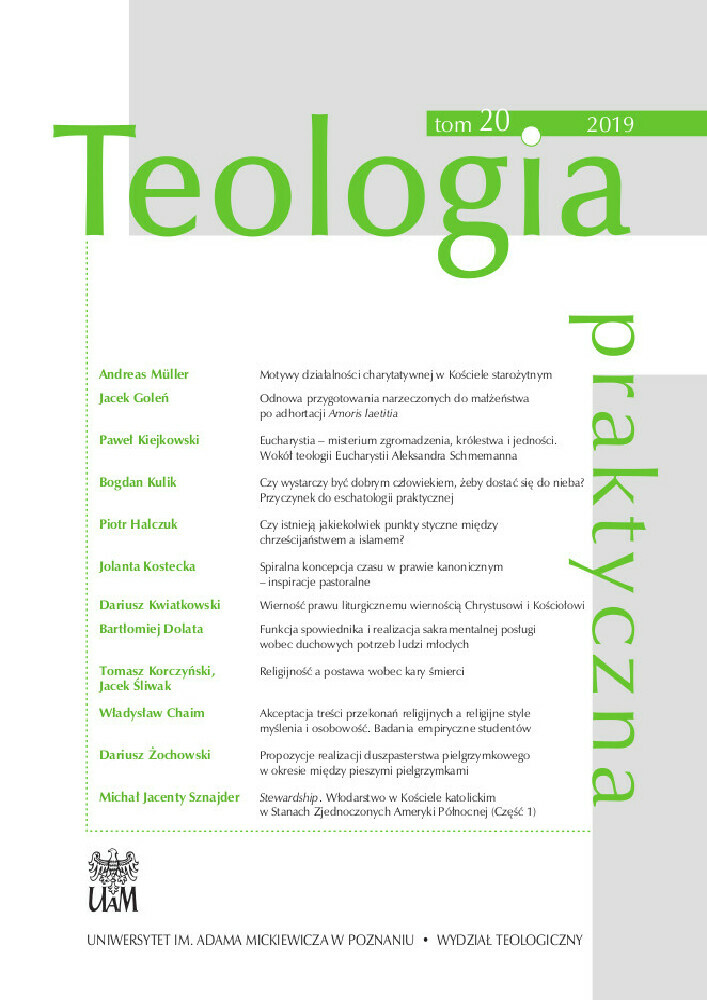Abstract
The sacrament of penance and reconciliation is a great gift for the Church. In it, man receives reconciliation with God and the Church, is purified and forms his Christian personality, brings to perfection his/her development of supernatural virtues and spiritual life. The confessor helps a person on this way. In the spirit of his calling, he serves as the Good Shepherd like Christ, as the Catechism of the Catholic Church teaches us (CCC 1465). The task that rests on the confessor is to take care of the people entrusted to him and to do this in the attitude of the servant who bends over the misery of man. The ministry of mercy, which the confessor performs, should always aim at the good of his fellow-creatures. Therefore, all directions given to the penitent should be adjusted so that they correspond as far as possible to his age and state. The article discusses the duties and competences of the priest. First, it presents the requirements for the sacrament, then their implementation in relation to the penitent, and finally shows the importance of these competences in the implementation of the sacramental service among young people, taking into consideration their expectations and problems.
References
Augustyn J. (red.) (2012): Sztuka spowiadania. Poradnik. Kraków.
Benedykt XVI (2007): Przemówienie do spowiedników papieskich bazylik i członków Penitencjarii Apostolskiej. „L’Osservatore Romano” 5: 2007 nr 43.
Ciccola G., Targoński F. (2003): Poradnik spowiednika. Kraków.
Ciereszko H. (2012): Ksiądz Michał Sopoćko wzorem spowiednika. W: J. Augustyn (red.), Sztuka spowiadania. Poradnik s. 335-345. Kraków.
Długosz A. (2012): Doniosłość, trud i piękno sakramentu pojednania. W: J. Augustyn (red.), Sztuka spowiadania. Poradnik s. 161-170. Kraków.
Dziewiecki M. (2012): Kompetencje spowiednika w rozumieniu penitenta. W: J. Augustyn (red.), Sztuka spowiadania. Poradnik s. 299-305. Kraków.
Franciszek (2013): Adhortacja Evangelii gaudium. Częstochowa.
Jan Paweł II (2012): Posługa kapłańska w sakramencie pojednania. W: J. Augustyn (red.), Sztuka spowiadania. Poradnik s. 247-251. Kraków.
Jan Paweł II (2004): Sakrament przebaczenia uzdrawia i uświęca. Przemówienie do uczestników kursu zorganizowanego przez Penitencjarię Apostolską w dniu 27 marca 2004 r. „L’Osservatore Romano” 6: 2004 s. 27-28.
Katechizm Kościoła katolickiego [KKK]. (2009). Poznań.
Kodeks prawa kanonicznego. (2008). Poznań.
Kongregacja ds. Duchowieństwa (2012): Posługa pokuty i pojednania w perspektywie świętości chrześcijańskiej. W: J. Augustyn (red.), Sztuka spowiadania. Poradnik s. 143-160. Kraków.
Kongregacja ds. Kultu Bożego (1973): Ordo Penitentiae.
Kroplewski Z. (2012): Kultura dialogowania w konfesjonale. W: J. Augustyn (red.), Sztuka spowiadania. Poradnik s. 263-270. Kraków.
Miralles A. (2009): Teologia Liturgica dei sacramenti. 4. Penitenza, 89-157. http://www.liturgiaetsacramenta.info/texts/tl_penitenza.pdf.
Pismo Święte Starego i Nowego Testamentu (Biblia Tysiąclecia). (2002). Poznań.
Płatek J.S. (1996): Sprawowanie sakramentu pokuty i pojednania. Częstochowa.
Płatek J.S. (2001): Sprawowanie sakramentu pokuty i pojednania. Częstochowa.
Sabik W. (2013): Podstawowe wyzwania dla spowiedników w Polsce. http://sfd.kuria.lublin.pl/index.phpOption=com_content&view=article&id=967:podstawowe-wyzwania-dla-spowiednikw-w-polsce-ks-w-sabik&catid=36:formacjakapaska&Itemid=65.html.
Smoleń J. (2012): Jak dzisiaj spowiadać ludzi młodych? W: J. Augustyn (red.), Sztuka spowiadania. Poradnik s. 385-391. Kraków.
Sobolewski Z. (2007): Vademecum dobrej spowiedzi. Warszawa.
Sobór Watykański II (1967): Dekret o posłudze i życiu kapłanów Presbyteriorum ordinis. W: Sobór Watykański II, Konstytucje, dekrety, deklaracje s. 754-812. Poznań.
Szentmartoni M. (1995): Psychologia pastoralna. Kraków.
Witek S. (1979): Sakrament pojednania. Podręcznik dla duszpasterzy. Poznań–Warszawa.
Wons K. (2012): Jak spotykać się z penitentem? Od przyjęcia prawdy o grzechu do przyjęcia przebaczenia i pokoju. W: J. Augustyn (red.), Sztuka spowiadania. Poradnik s. 271-288. Kraków.
Zagrodzki W. (2012): Spowiednik u źródeł kryzysu spowiedzi? W: J. Augustyn (red.), Sztuka spowiadania. Poradnik s. 171-181. Kraków.
License
Autorzy
Autorzy tekstów przyjętych do publikacji w czasopiśmie Teologia Praktyczna są zobowiązani do wypełnienia, podpisania i odesłania na adres redakcji umowy o udzielenie nieodpłatnej licencji do utworów, z zobowiązaniem do udzielania sublicencji CC.
Zgodnie z umową, autorzy tekstów opublikowanych w czasopiśmie Teologia Praktyczna udzielają Uniwersytetowi im. Adama Mickiewicza w Poznaniu niewyłącznej i nieodpłatnej licencji oraz zezwalą na użycie sublicencji Creative Commons Attribution-NoDerivatives 4.0 International (CC BY-ND 4.0).
Autorzy zachowują prawa do dalszego, swobodnego rozporządzania utworem.
Użytkownicy
Zainteresowani użytkownicy internetu uprawnieni są do korzystania z utworów opublikowanych od 2015 roku w Teologii Praktycznej pod następującymi warunkami:
- uznanie autorstwa - obowiązek podania wraz z rozpowszechnionym utworem, informacji, o autorstwie, tytule, źródle (odnośniki do oryginalnego utworu, DOI) oraz samej licencji;
- bez tworzenia utworów zależnych - utwór musi być zachowany w oryginalnej postaci, nie można bez zgody twórcy rozpowszechniać np. tłumaczeń, opracowań.
Do wszystkich tekstów opublikowanych przed 2015 r. prawa autorskie są zastrzeżone.
Inne
Uniwersytet im. Adama Mickiewicza w Poznaniu zachowuje prawo do czasopisma jako całości (układ, forma graficzna, tytuł, projekt okładki, logo itp.).

